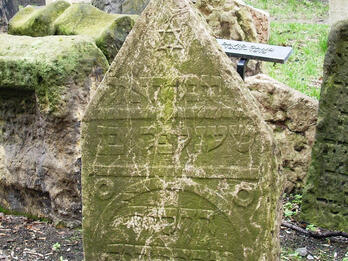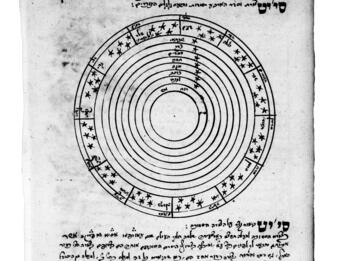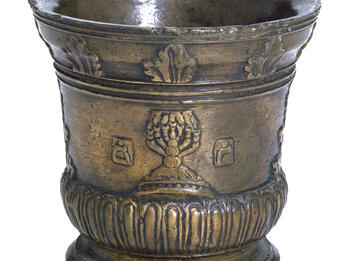Sefer ha-ḥayim (The Book of Life)
Merits, Section I, Chapter 1
In which it is explained that the essence of the Torah is the performance of the commandments, not intellectual knowledge; and also the reason why it is called the Talmud; and why the mishnah of “Moses received the Torah [from Sinai]” is used as the introduction to tractate Avot; and why he is called “Moses our Teacher” rather than “our Teacher Moses,” and the same for Isaiah the Prophet; and on how a child becomes worthy of the world to come; and the meaning of blessings over the Torah; and the meaning of the verse, and you shall be for me a kingdom of priests [and a holy nation] (Exodus 19:6).
The Torah can be divided into two parts. The first part is intellectual knowledge and knowledge of the secrets of the Torah and its esoteric meaning, which is called divine wisdom. The second part is the knowledge of the commandments, which is called the law of man. The philosophers chose for themselves the first part, for several reasons:
The first reason is that they believe that one’s spiritual success depends solely on intellectual knowledge, for when man deals with lofty matters and his soul and intellect cleave to God, he too becomes spiritual like them. For what does the light of the commandments give or add to the soul, seeing that they are merely behavioral instructions to man in his human state?
The second reason is that the Torah is eternal only on account of this aspect of intellectual knowledge, for just as lofty matters do not change, so too the knowledge of them does not change. The same is not true of the knowledge of the commandments, which serve to instruct man on his personal conduct, as these can change in correspondence with changes in people.
The third reason is that the main pleasantness and sweetness of the Torah is due to nothing other than that intellectual knowledge which a person achieves of his own accord. For one takes pleasure only in his own wisdom, not something that he learned and received from another. The soul takes no joy in the knowledge of the laws of a penny, or the correct judgment in the case of two people who are grabbing hold of a single robe [see m. Bava Meẓi‘a 1:1] and the like.
The fourth reason is that it is a commandment to know and believe, and whoever relies on tradition alone is equated to a servant who receives coins from his master but does not bother to count them, and later finds that some coins are missing. It is clear that he did not complete his task. These are the arguments of the philosophers.
Now lend me your ear and listen to the words of the sages, the sages of truth who have faith in the truth of their Maker. In actual fact, it is the second part, the knowledge of the commandments, which is the essence, and man should interpret and focus his studies only on this part, as this alone is the divine aspect of man. As for the lofty wisdom, no eye has seen it besides You [see Isaiah 64:3], as He alone comprehends its ways.
Regarding the philosophers’ proof from the eternity of the Torah, the exact opposite is the case: how can they boast about the eternity of their wisdom when they believe only in what their intellect can initially grasp? Due to the many uncertainties in their minds, which are unable to meet the requirements of that wisdom, not many of them become wise. In most cases, he himself will not agree today with the argument that he accepted yesterday. Thus, they always end up in a state of doubt and thereby endanger their souls. And yet they invariably remain wise in their own eyes, and refuse to accept what the other has to say. Rather, each builds his own castle out of his beliefs in accordance with what seems best to him, and then another comes along and breaks down what the other had constructed, until they have lost all faith. How, then, can this be called eternal wisdom?
By contrast, the same is not true of the descendants of Jacob, the faithful seed, as they are students who listen to the voices of their great elders in order to receive the truth. Even their greatest ones are only called wise students [talmide ḥakhamim], as they consider themselves as mere disciples of one another. Likewise, it is for the same reason that the Oral Torah is called the Talmud.
Not only is knowledge of the foundational principles of the Torah and the mitzvot, and their meaning and justifications, based on tradition [received by and] not invented by our ancestors, so, too, are all good personal traits and proper conduct. They all derive from a tradition of the earliest holy forefathers, each one of whom handed it down to the next master, all the way back to Moses our Teacher, may he rest in peace. And this is the reason why the mishnah of “Moses received the Torah [from Sinai]” serves as the introduction to tractate Avot. It teaches us that even this tractate comes from an ancestral tradition, despite the fact that it deals exclusively with good conduct.
Even Moses our Teacher, may he rest in peace, who is the father of all wise men, is not called “our Teacher Moses,” but “Moses our Teacher.” This indicates that we do not accept his Torah as the true Torah because of his great wisdom, but rather because he was the most humble of men [see Numbers 12:3], for he considered himself as merely Moses. He himself relied solely on the tradition of the Torah that he received from the mouth of the Almighty at Sinai. It is in this fashion that he became our Teacher, as he then proceeded to teach it to us.
The same applies to prophecy—man does not achieve it by means of his wisdom, but through divine abundance and the light of His face, when He chooses to bestow it. Therefore, the prophets are mentioned by name first: “Isaiah the Prophet,” and “Jeremiah the Prophet” are not called “the Prophet Isaiah,” “the Prophet Jeremiah,” and likewise for all the prophets. The principle that “the greatest of the sages are called by name”1 is based on similar reasoning. All of this is due to the eternity of our Torah, as it is not the wisdom of man, learned by rote [see Isaiah 29:13], but the word of God, which will stand forever [see Psalms 33:11].
As for their claim regarding one’s spiritual success, here too the reverse is the case. For according to their argument, only a few, select individuals will merit spiritual success, such as Aristotle and the like. All this, and then only a chance of success?!2 Heaven forfend that we should believe this, since the Torah is a kindness from God, which is for the benefit of all people, whether wise or simple, as it is stated: Moses commanded us the Torah, an inheritance of the congregation of Jacob (Deuteronomy 33:4). By contrast, the performance of the commandments is the same for the whole congregation of Jacob, as there is no righteous person on earth [see Ecclesiastes 7:20] who is not in need of this instruction. On the contrary, wicked people and simpletons require the guidance of the Torah more than the righteous and the wise. Furthermore, there is no Jew who does not busy himself with at least one of the commandments, and it is in this manner that he earns some portion of the world to come. This is the meaning of the teaching of our sages, of blessed memory, that all Israel have a share in the world to come [see m. Sanhedrin 10:1]. The difference is that not all the portions are equal, as all depends on the number of one’s deeds [see m. Avot 3:15].
Similarly, in the tenth chapter [of tractate Sanhedrin] our sages, of blessed memory, said that from the time a child begins to speak, or from when he answers “Amen,” he becomes worthy of the world to come [110b]. All this is a clear proof that one’s spiritual success does not depend merely on his study of wisdom, as the philosophers maintain, for when a child first begins to talk he has as yet no intellectual knowledge at all. Even so, his father brings him into the life of the world to come by educating him in the performance of the commandments.
Furthermore, our sages of blessed memory did not say that it is a commandment “to become wise and believe,” but rather “to know and believe.” By this they meant that one must be familiar with the characteristics of the fundamentals of the faith and its roots, as we received them from Moses our Teacher, may he rest in peace. Accordingly, the formula of the blessing over the Torah is not “who commanded us to learn Torah,” but rather “who commanded us to occupy ourselves with words of Torah,” for the essential matter is to occupy oneself with the performance of the Torah. This also expresses the idea that even when the reason for a commandment is unknown to us, and we perform it merely like people dealing with holy matters unawares [see, e.g., b. ḥullin 31b], even so, we still fulfill our duty.
Since the knowledge of the reasons for the commandments certainly brings great satisfaction and enjoyment to one who performs them, we therefore pray that “our Lord God should make the words of His Torah sweet in our mouths” etc., and that “we and our offspring, and our offspring’s offspring, and the offspring of Your nation, the House of Israel should all know Your name.” This is referring to the knowledge of the reasons for the commandments, which is the knowledge of His great name, as is known to the kabbalists.
After the faithful messenger [i.e., Moses; see Proverbs 25:13] expounded and studied all these interpretations, and learned them from the mouth of the Almighty, he then proceeded to arrange them before us like a set table [shulḥan ‘arukh] upon which all types of spiritual delights are laid out. And the wisdom of the Torah cries aloud in the streets [see Proverbs 1:20], saying: come, eat of my bread, and drink of the wine that I have mingled (Proverbs 9:5). Why, then, should we strain our minds for no reason, by contemplating how this bread was prepared—how it was sown, how it was reaped, ground, sifted, baked, and the like? Our sole task is to eat and enjoy.
It is regarding this idea that the verse states: and you shall be for me a kingdom of priests (Exodus 19:6). The meaning is that just as a priest who is standing in the sanctuary of his God should not be reflecting on that sanctuary, on how it was built, but instead should merely stand ready to serve his God, and contemplate the service of the sanctuary rather than its construction, the same applies here. Thus, it is the performance of the commandments which provides delight to the soul that enjoys the table of the Most High, which is filled with the blessings of the Lord (Deuteronomy 33:23). This is not the case for the philosophers, as they end up with nothing more than striving after wind (Ecclesiastes 1:17) and a broken heart.
Nevertheless, even though the performance of the commandments is the main thing, and we should not question the truth of our tradition, if one can imbue the performance of a commandment with a lofty, spiritual meaning, you should do so. You will be rewarded for this, despite the fact that you did not receive the idea from a sage who follows the tradition, and you did not even see it in any of the books of the sages. It is for this reason that we conclude the blessings over the Torah with the formula, “blessed [are You, God,] who teaches Torah to His people Israel,” and we similarly conclude with, “blessed [are You, God,] who gives the Torah.” Both of these are in the present tense, as He still continues to give us His Torah every day, since each person can innovate Torah ideas, provided that he accepts the basic tenets of the religion and the faith. One should also believe that there are other statements of God, apart from the words of the Torah themselves; one higher than the high watches, and there are higher than they (Ecclesiastes 5:7). The end of the matter is that one should have faith in the Maker [see Ecclesiastes 12:13] that each and every commandment hangs on a different part of the [divine] chariot, and even though the ways of the Torah and its secrets are concealed from us, we will observe and perform all the words of this Torah [see Deuteronomy 29:28], and then we will earn a reward for both the performance and the study.
In contrast, since the philosophers are not in the category of those who perform the commandments, even their great amount of study is considered worthless. This is what the sages of blessed memory expounded on the verse, “that you may learn and perform them” [see Deuteronomy 5:1], that is, “whoever is involved in the performance is involved in the study, and whoever is not involved in the performance is not involved in the study” [b. Yevamot 109b].
Notes
[I.e., the truly great sages of the Talmud, such as Hillel and Samuel, are not given the title of “rabbi.”—Trans.]
[See b. ḥagigah 4b.—Trans.]
Credits
Ḥayim ben Bezalel, Sefer ha-ḥayim (The Book of Life) (Friedberg: 1588; first printed Kraków: 1593). Republished as: Ḥayim ben Bezalel, Sefer ha-ḥayim (The Book of Life) (Warsaw: Nathaniel David Zisberg, 1876), 4–6.
Published in: The Posen Library of Jewish Culture and Civilization, vol. 5.





